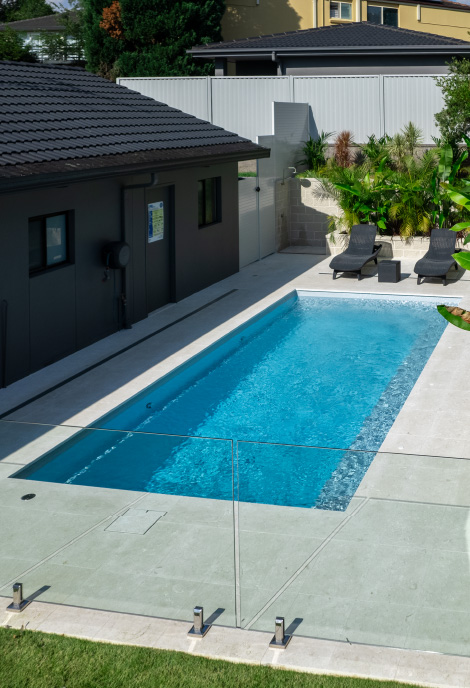For many homeowners, a swimming pool is more than just a luxury—it's a central feature of the home that offers relaxation, recreation, and a space for social gatherings. Whether it’s a weekend family barbecue, an afternoon swim to beat the heat, or a tranquil evening dip, the pool serves as a versatile venue for various activities. However, behind the shimmering water and the sound of joyous splashes lies a complex system that requires regular maintenance and professional oversight to ensure safety and functionality. This brings us to an often overlooked yet crucial aspect of pool ownership: professional pool inspections. Regular inspections can help identify potential issues like leaks, faulty pumps, or chemical imbalances before they become bigger problems, ultimately saving homeowners time and money while ensuring the pool remains a safe and enjoyable feature of the home.

Why Regular Pool Inspections Matter
Ensuring Safety and Compliance
The primary reason for regular pool inspections is to ensure the safety of all users. Pools can pose significant risks, from slippery surfaces and sharp edges to faulty electrical systems and chemical imbalances. A professional inspection identifies these hazards and ensures that your pool adheres to local and national safety regulations. Compliance not only protects your family and guests but also shields you from potential legal liabilities.
Additionally, regular inspections can help maintain the pool’s overall condition, preventing costly repairs down the line. Inspectors will check for signs of wear and tear, such as cracks in the pool structure, malfunctioning filtration systems, and the integrity of the pool’s protective barriers. By catching these issues early, you can address them promptly, ensuring your pool remains a safe and enjoyable space for everyone. Regular inspections also provide peace of mind, knowing that every precaution has been taken to create a secure swimming environment.
Preventing Costly Damages and Repairs
A small crack in the pool’s surface or a minor leak in the plumbing might seem inconsequential at first. However, these issues can quickly escalate, leading to extensive damage and costly repairs. For instance, a tiny crack can grow larger due to constant exposure to water and temperature changes, potentially compromising the pool’s structural integrity. Similarly, a minor plumbing leak can lead to water damage, mould growth, and increased water bills. Regular inspections catch these problems early, allowing for timely interventions that save you money in the long run. Whether it’s a malfunctioning pump causing inadequate water circulation or deteriorating tiles that pose safety hazards, addressing minor issues during an inspection prevents them from becoming major headaches. Investing in routine maintenance ensures the longevity and safety of your pool, ultimately enhancing your overall swimming experience.

The Professional Pool Inspection Process
Structural and Mechanical Analysis
A professional pool inspection is a comprehensive evaluation that covers various aspects of the pool, including its structure, mechanical systems, and safety features. Inspectors will check for cracks, leaks, and signs of wear and tear in the pool’s shell and decking. They will also examine the condition of the plumbing, filtration, and heating systems, ensuring that everything is in optimal working order.
Benefits of Hiring a Certified Pool Inspector
Hiring a certified pool inspector offers numerous advantages. These professionals are trained to identify issues that the untrained eye may overlook, such as subtle cracks, leaks, or signs of wear and tear. They use specialised equipment to detect problems beneath the surface, including advanced tools like pressure testers and thermal imaging cameras, providing a thorough assessment that goes beyond a basic visual check. Additionally, certified inspectors can offer expert advice on maintenance practices tailored to your specific pool type and usage. They can recommend necessary repairs or upgrades to ensure optimal safety and efficiency. This proactive approach can save pool owners time and money in the long run by addressing small issues before they become costly repairs. Moreover, having a certified inspection report can be beneficial when selling a property, as it provides potential buyers with confidence in the pool’s condition.
Signs Your Pool Needs an Inspection
Common Red Flags
Several indicators suggest it’s time for a professional pool inspection. If you notice a drop in water level beyond normal evaporation, it could signal a leak. Algae growth, cloudy water, or unusual chemical odours indicate possible imbalances in the water chemistry. Unusual noises from the pump or heater and visible cracks or stains in the pool surface are also red flags that warrant a professional evaluation.
Conducting a Basic Self-Inspection
While professional inspections are essential, homeowners can perform basic self-inspections between visits. Regularly check the pool’s water level, clarity, and chemical balance. Inspect the pool area for signs of wear and tear, and ensure that safety equipment, such as gates and alarms, is functioning correctly. These routine checks help maintain your pool in good condition and provide early warning signs of potential issues.

The Impact of Pool Inspections on Home Values
Enhancing Property Value
Regular pool inspections significantly impact the value of your property. A well-maintained pool is a valuable asset that can increase your home’s market appeal, attracting potential buyers and boosting overall property value. Prospective buyers are more likely to invest in a property with an inspected, problem-free pool, knowing they won’t face unexpected repair costs and potential safety hazards. On the other hand, neglected pools can deter buyers and reduce your property’s overall value, often leading to costly repairs and devaluation. Regular inspections and documented maintenance can serve as strong selling points, demonstrating your commitment to upkeep, safety, and the long-term care of your home. By ensuring your pool is in top condition, you not only enhance your enjoyment but also protect your investment, making your property more desirable in the competitive real estate market.
Conclusion
In summary, professional pool inspections are indispensable for ensuring safety, preventing costly damages, and maintaining the aesthetic and functional integrity of your pool. These inspections involve a thorough examination of every component, from the pool’s structural integrity to the functionality of its filtration and heating systems. Regular inspections not only keep your pool in top condition but also enhance your property’s value and provide peace of mind, knowing that your water quality is optimal and your equipment is running smoothly. If you haven’t had your pool inspected recently, now is the time to act. Contact a certified pool inspector today and schedule your professional pool inspection. Your pool, your family, and your investment deserve nothing less than the best care and attention to detail.
For many homeowners, a swimming pool is more than just a luxury—it's a central feature of the home that offers relaxation, recreation, and a space for social gatherings. Whether it’s a weekend family barbecue, an afternoon swim to beat the heat, or a tranquil evening dip, the pool serves as a versatile venue for various activities. However, behind the shimmering water and the sound of joyous splashes lies a complex system that requires regular maintenance and professional oversight to ensure safety and functionality. This brings us to an often overlooked yet crucial aspect of pool ownership: professional pool inspections. Regular inspections can help identify potential issues like leaks, faulty pumps, or chemical imbalances before they become bigger problems, ultimately saving homeowners time and money while ensuring the pool remains a safe and enjoyable feature of the home.

Why Regular Pool Inspections Matter
Ensuring Safety and Compliance
The primary reason for regular pool inspections is to ensure the safety of all users. Pools can pose significant risks, from slippery surfaces and sharp edges to faulty electrical systems and chemical imbalances. A professional inspection identifies these hazards and ensures that your pool adheres to local and national safety regulations. Compliance not only protects your family and guests but also shields you from potential legal liabilities.
Additionally, regular inspections can help maintain the pool’s overall condition, preventing costly repairs down the line. Inspectors will check for signs of wear and tear, such as cracks in the pool structure, malfunctioning filtration systems, and the integrity of the pool’s protective barriers. By catching these issues early, you can address them promptly, ensuring your pool remains a safe and enjoyable space for everyone. Regular inspections also provide peace of mind, knowing that every precaution has been taken to create a secure swimming environment.
Preventing Costly Damages and Repairs
A small crack in the pool’s surface or a minor leak in the plumbing might seem inconsequential at first. However, these issues can quickly escalate, leading to extensive damage and costly repairs. For instance, a tiny crack can grow larger due to constant exposure to water and temperature changes, potentially compromising the pool’s structural integrity. Similarly, a minor plumbing leak can lead to water damage, mould growth, and increased water bills. Regular inspections catch these problems early, allowing for timely interventions that save you money in the long run. Whether it’s a malfunctioning pump causing inadequate water circulation or deteriorating tiles that pose safety hazards, addressing minor issues during an inspection prevents them from becoming major headaches. Investing in routine maintenance ensures the longevity and safety of your pool, ultimately enhancing your overall swimming experience.

The Professional Pool Inspection Process
Structural and Mechanical Analysis
A professional pool inspection is a comprehensive evaluation that covers various aspects of the pool, including its structure, mechanical systems, and safety features. Inspectors will check for cracks, leaks, and signs of wear and tear in the pool’s shell and decking. They will also examine the condition of the plumbing, filtration, and heating systems, ensuring that everything is in optimal working order.
Benefits of Hiring a Certified Pool Inspector
Hiring a certified pool inspector offers numerous advantages. These professionals are trained to identify issues that the untrained eye may overlook, such as subtle cracks, leaks, or signs of wear and tear. They use specialised equipment to detect problems beneath the surface, including advanced tools like pressure testers and thermal imaging cameras, providing a thorough assessment that goes beyond a basic visual check. Additionally, certified inspectors can offer expert advice on maintenance practices tailored to your specific pool type and usage. They can recommend necessary repairs or upgrades to ensure optimal safety and efficiency. This proactive approach can save pool owners time and money in the long run by addressing small issues before they become costly repairs. Moreover, having a certified inspection report can be beneficial when selling a property, as it provides potential buyers with confidence in the pool’s condition.
Signs Your Pool Needs an Inspection
Common Red Flags
Several indicators suggest it’s time for a professional pool inspection. If you notice a drop in water level beyond normal evaporation, it could signal a leak. Algae growth, cloudy water, or unusual chemical odours indicate possible imbalances in the water chemistry. Unusual noises from the pump or heater and visible cracks or stains in the pool surface are also red flags that warrant a professional evaluation.
Conducting a Basic Self-Inspection
While professional inspections are essential, homeowners can perform basic self-inspections between visits. Regularly check the pool’s water level, clarity, and chemical balance. Inspect the pool area for signs of wear and tear, and ensure that safety equipment, such as gates and alarms, is functioning correctly. These routine checks help maintain your pool in good condition and provide early warning signs of potential issues.

The Impact of Pool Inspections on Home Values
Enhancing Property Value
Regular pool inspections significantly impact the value of your property. A well-maintained pool is a valuable asset that can increase your home’s market appeal, attracting potential buyers and boosting overall property value. Prospective buyers are more likely to invest in a property with an inspected, problem-free pool, knowing they won’t face unexpected repair costs and potential safety hazards. On the other hand, neglected pools can deter buyers and reduce your property’s overall value, often leading to costly repairs and devaluation. Regular inspections and documented maintenance can serve as strong selling points, demonstrating your commitment to upkeep, safety, and the long-term care of your home. By ensuring your pool is in top condition, you not only enhance your enjoyment but also protect your investment, making your property more desirable in the competitive real estate market.
Conclusion
In summary, professional pool inspections are indispensable for ensuring safety, preventing costly damages, and maintaining the aesthetic and functional integrity of your pool. These inspections involve a thorough examination of every component, from the pool’s structural integrity to the functionality of its filtration and heating systems. Regular inspections not only keep your pool in top condition but also enhance your property’s value and provide peace of mind, knowing that your water quality is optimal and your equipment is running smoothly. If you haven’t had your pool inspected recently, now is the time to act. Contact a certified pool inspector today and schedule your professional pool inspection. Your pool, your family, and your investment deserve nothing less than the best care and attention to detail.


